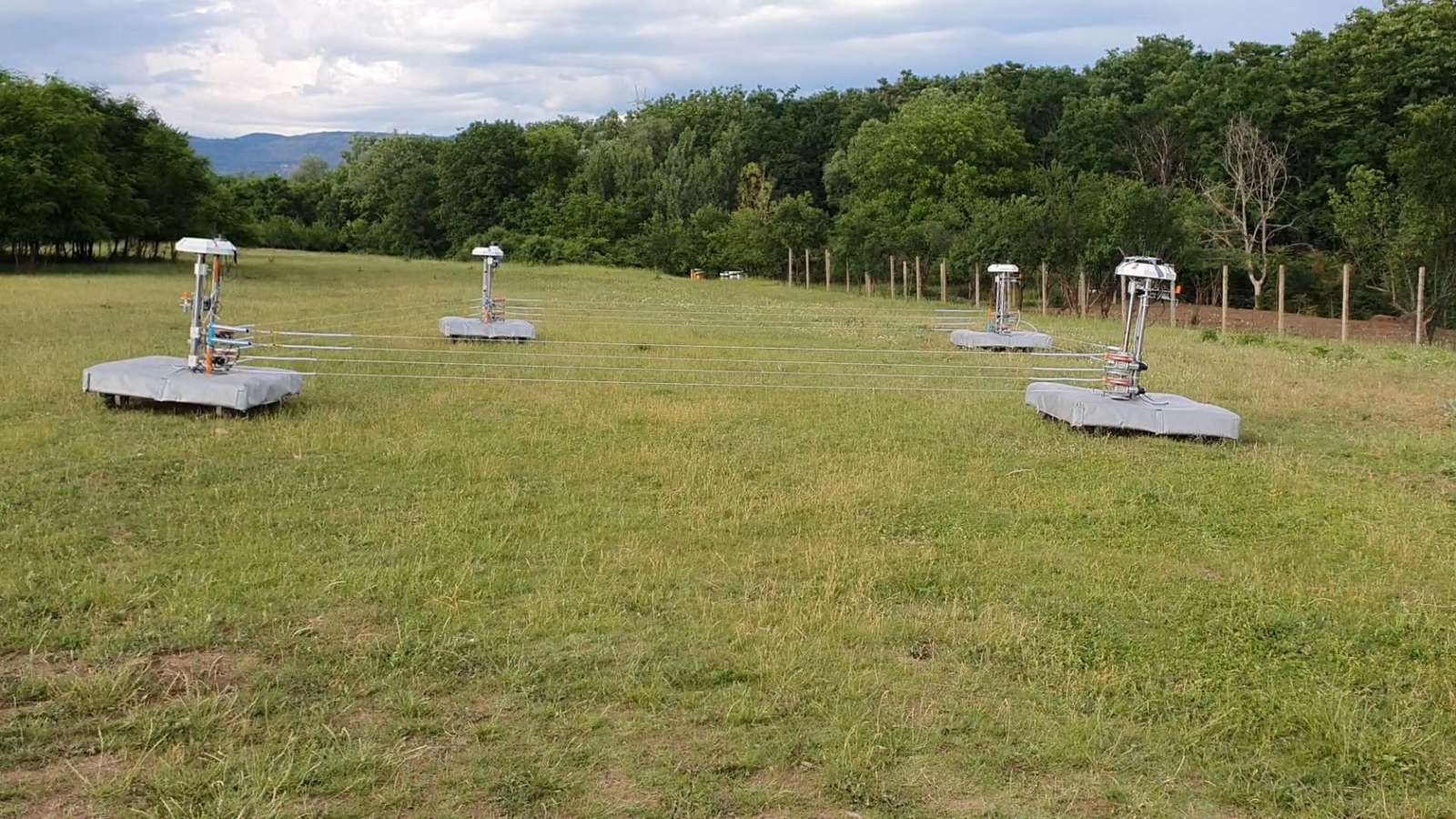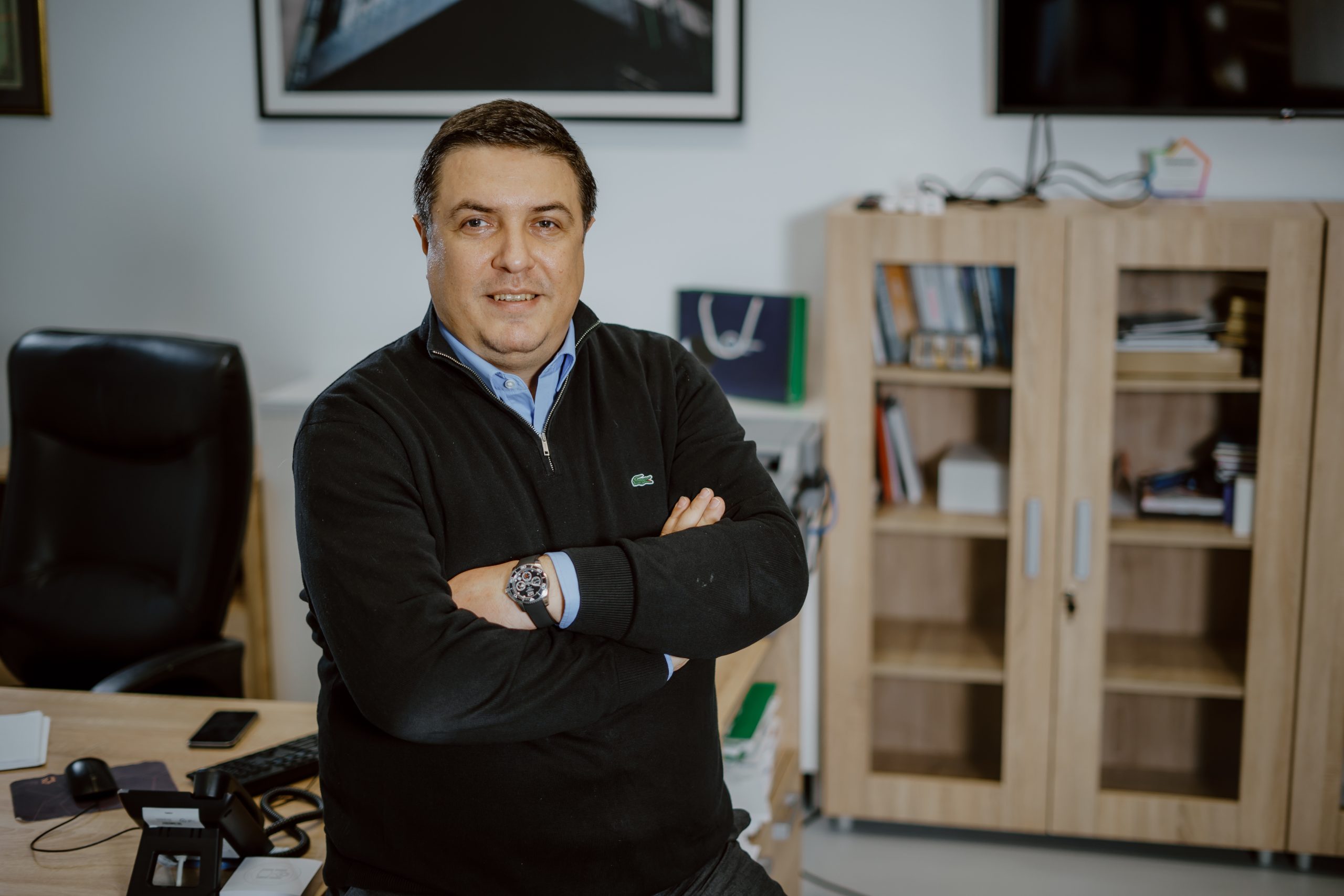
Most likely, many of you are familiar with RoboCop, the protagonist of an 80s film who was half-human and half-machine. During that era, the concept of robots replacing humans in various roles was merely a notion portrayed in science fiction movies. However, over the following decades, this idea gradually transformed into reality, and nowadays we witness robots assisting us in diverse tasks. Recently, a notable example of this has emerged in Serbia. Nevertheless, this time, the objective is not to substitute human labor but rather to address tasks associated with animal behavior, specifically those pertaining to sheepdogs.
Coming Computer Engineering, a Serbian information technology company, has collaborated with engineers from the University of Niš’s Faculty of Mechanical Engineering to develop and introduce a state-of-the-art, multifunctional robot known as the RoboShepherd. This innovative creation tackles one of the major challenges faced by agricultural producers in Serbia: the scarcity of available workers.
“The RoboShepherd has been designed to revitalise traditional livestock farming, encompassing the rearing of cattle in pastures.”
Dušan Krstić, project manager at Coming Computer Engineering
“The RoboShepherd has been designed to revitalise traditional livestock farming, encompassing the rearing of cattle in pastures,” states Dušan Krstić, the project manager at Coming Computer Engineering. “Given the limited agricultural workforce available, our objective was to replace humans with robots. These robots will guide the animals to the pastures, protect them from predators, and ensure they graze the appropriate amount of grass.” The prospect of seeing robotic shepherds tending to a flock of 620 sheep could become a familiar sight in Serbian pastures. In addition to livestock care, Coming Computer is also developing robots for various other agricultural tasks, such as planting, irrigation, harvesting, and ploughing.
Unlike many machines, these electronic assistants are capable of operating on exceedingly steep terrains.
“We have tested the prototype’s ability to pull 345 kilograms up a 30% incline, employing an automatic levelling system,” explains Nikola Velčev, an engineer at Coming. “This system allows the robot to lower its front section when encountering steep slopes, preventing it from toppling over when carrying substantial weights or towing a trailer.” The robot is also adaptable for ground-level operations, such as picking strawberries, and can instantly adjust its robotic platform to raise its arm up to 2 meters in height. “Our aim is to develop a platform that can incorporate various add-ons for different activities,” elaborates Velčev. “The robot is controlled using a joystick, equipped with sensor-supported movement that can detect obstacles and avoid them. With the assistance of GPS navigation, it will be capable of autonomously returning from the pasture to the stable.”
Over the next three years, the robots will enter production, with a pricing strategy intended to make them affordable for small-scale agricultural producers. Presently, robots of this kind cost over €100,000, rendering them inaccessible to the majority of farmers in Serbia and the surrounding region.

“The Science-Technology Park’s essence lies in establishing a community of innovative companies, fostering knowledge exchange, mutual support, and active participation in organized activities.”
Milan Ranđelović, Director, Science-Technology Park Niš
Elevating the Standards in Advanced Farming
Typically, it would require five to ten years to develop such distinctive agricultural solutions based on artificial intelligence. Even for global high-tech companies based in prominent information technology hubs like Silicon Valley. However, the innovators at the Science-Technology Park in Niš accomplished this feat in a remarkable three years, aided by support from the Republic of Serbia’s Innovation Fund and the European Union.
Among the numerous enterprises operating within the Science-Technology Park in Niš, an innovation hub inaugurated in 2020, lies Coming Computer Engineering. The Park has emerged as a regional focal point for the advancement of inventive scientific and technological projects, along with their international promotion. It collaborates closely with the university and academic community, uniting over 500 young IT engineers to propel the region towards becoming a global hub for cutting-edge technologies.
“The Science-Technology Park’s essence lies in establishing a community of innovative companies, fostering knowledge exchange, mutual support, and active participation in organized activities,” asserts Milan Ranđelović, the director of the Science-Technology Park. “Our goal is to bolster local high-tech entrepreneurs and enhance awareness while strengthening the entire innovation ecosystem within the region.”
Together with its virtual members, the companies situated within the Park employ approximately 5,000 individuals. The construction of the Science-Technology Park’s premises was financed by the Serbian government and a loan from the European Investment Bank secured in 2010 for the research and development sector in Serbia.
About the project
The Public Sector Research and Development (R&D) project concerns a series of investments aimed at revitalising the country’s public R&D activity. The investments include the upgrading of existing infrastructure, the creation of a center for promotion of science, the construction of accommodations for students and young scientists’ accommodation and creation of centres of excellence in priority research fields. The cost of the project is estimated at an estimated investment cost of €420 million. The project is fully in line with the EIB’s lending priorities for the strengthening and development of activities in support of the Candidate and Potential Candidate Countries. The European Investment Bank, the long-term financing institution of the European Union, supports viable capital investment projects furthering the policy objectives of the Union. In the countries of the Western Balkans, the financing operations of the EIB contribute to facilitating the integration process with the European Union. Since 2001, the EIB has extended €2.6 billion in favour of projects in Serbia.
Photo credits: Technology Park in Nis
“The RoboShepherd has been designed to revitalise traditional livestock farming, encompassing the rearing of cattle in pastures,” states Dušan Krstić, the project manager at Coming Computer Engineering. “Given the limited agricultural workforce available, our objective was to replace humans with robots. These robots will guide the animals to the pastures, protect them from predators, and ensure they graze the appropriate amount of grass.” The prospect of seeing robotic shepherds tending to a flock of 620 sheep could become a familiar sight in Serbian pastures. In addition to livestock care, Coming Computer is also developing robots for various other agricultural tasks, such as planting, irrigation, harvesting, and ploughing.
Unlike many machines, these electronic assistants are capable of operating on exceedingly steep terrains.
“We have tested the prototype’s ability to pull 345 kilograms up a 30% incline, employing an automatic levelling system,” explains Nikola Velčev, an engineer at Coming. “This system allows the robot to lower its front section when encountering steep slopes, preventing it from toppling over when carrying substantial weights or towing a trailer.” The robot is also adaptable for ground-level operations, such as picking strawberries, and can instantly adjust its robotic platform to raise its arm up to 2 meters in height. “Our aim is to develop a platform that can incorporate various add-ons for different activities,” elaborates Velčev. “The robot is controlled using a joystick, equipped with sensor-supported movement that can detect obstacles and avoid them. With the assistance of GPS navigation, it will be capable of autonomously returning from the pasture to the stable.”
Over the next three years, the robots will enter production, with a pricing strategy intended to make them affordable for small-scale agricultural producers. Presently, robots of this kind cost over €100,000, rendering them inaccessible to the majority of farmers in Serbia and the surrounding region.

Elevating the Standards in Advanced Farming
Typically, it would require five to ten years to develop such distinctive agricultural solutions based on artificial intelligence. Even for global high-tech companies based in prominent information technology hubs like Silicon Valley. However, the innovators at the Science-Technology Park in Niš accomplished this feat in a remarkable three years, aided by support from the Republic of Serbia’s Innovation Fund and the European Union.
Among the numerous enterprises operating within the Science-Technology Park in Niš, an innovation hub inaugurated in 2020, lies Coming Computer Engineering. The Park has emerged as a regional focal point for the advancement of inventive scientific and technological projects, along with their international promotion. It collaborates closely with the university and academic community, uniting over 500 young IT engineers to propel the region towards becoming a global hub for cutting-edge technologies.
“The Science-Technology Park’s essence lies in establishing a community of innovative companies, fostering knowledge exchange, mutual support, and active participation in organized activities,” asserts Milan Ranđelović, the director of the Science-Technology Park. “Our goal is to bolster local high-tech entrepreneurs and enhance awareness while strengthening the entire innovation ecosystem within the region.”
Together with its virtual members, the companies situated within the Park employ approximately 5,000 individuals. The construction of the Science-Technology Park’s premises was financed by the Serbian government and a loan from the European Investment Bank secured in 2010 for the research and development sector in Serbia.
About the project
The Public Sector Research and Development (R&D) project concerns a series of investments aimed at revitalising the country’s public R&D activity. The investments include the upgrading of existing infrastructure, the creation of a center for promotion of science, the construction of accommodations for students and young scientists’ accommodation and creation of centres of excellence in priority research fields. The cost of the project is estimated at an estimated investment cost of €420 million. The project is fully in line with the EIB’s lending priorities for the strengthening and development of activities in support of the Candidate and Potential Candidate Countries. The European Investment Bank, the long-term financing institution of the European Union, supports viable capital investment projects furthering the policy objectives of the Union. In the countries of the Western Balkans, the financing operations of the EIB contribute to facilitating the integration process with the European Union. Since 2001, the EIB has extended €2.6 billion in favour of projects in Serbia.
Photo credits: Technology Park in Nis
Please wait while your video is being uploaded...
Don't close this window!